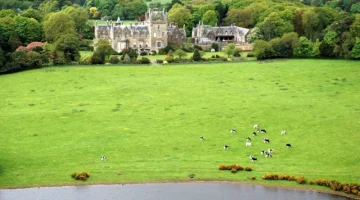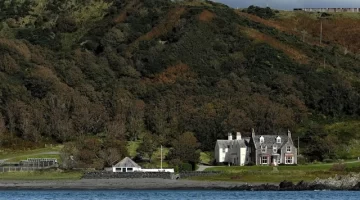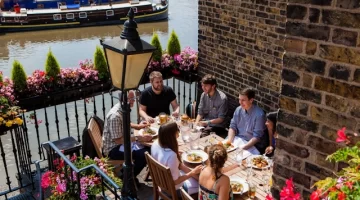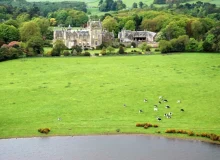The Scottish Borders
The Travel Pages guide to the Scottish Borders with its medieval abbeys, stately homes, ancient history, and attractive towns like Peebles to stay in.

Some of Scotland’s loveliest scenery is right on Edinburgh‘s and England’s doorsteps. The Scottish Borders region stretches east of the capital to the coast and south to the border with England.
It has an idyllic, rolling landscape perfect for walking, cycling, golf, fishing and other outdoor sports. It’s a traditional area for weaving, and picturesque old mill towns lie along the banks of the River Tweed.

The Border Reivers
The region wasn’t always so peaceful. During medieval times it was often the scene of cross-border warfare as English forces tried to conquer Scottish territory. When they weren’t fighting the English, Border dwellers had to defend their land against the Border Reivers, or cattle thieves.
Smailholm Tower, which stands on a lonely outcrop near Kelso, is a 15th-century defensive tower that was used to keep watch for invaders. Many towns still hold annual pageants called the Common Ridings, gathering to patrol their lands on horseback as their ancestors did.

Peebles
Set along the River Tweed, Peebles makes an attractive base for exploring the Borders, and is one of our favourite towns to visit. It’s the starting point for several good walks which follow the river past Neidpath Castle, a medieval tower house, across old railway bridges and through woodlands and farmland.

Scottish Borders Medieval Abbeys
The ruins of four great medieval abbeys can be visited on a scenic drive. Melrose Abbey is the best preserved, with much carved detail remaining in its pinkish facade. The heart of the Scottish hero Robert the Bruce was buried here. Jedburgh Abbey, the largest, is an impressive sight. In the town you can also visit the Mary Queen of Scots House, a fortified house where she took refuge in 1566.
Little is left of Kelso Abbey, once the largest and richest of them all, set in the pretty town centre. Dryburgh Abbey stands in lovely grounds on the banks of the Tweed, and is the burial place of Scotland’s great writer, Sir Walter Scott.

Scottish Borders Stately Homes
You can visit several stately homes in the Borders, but perhaps none is more interesting than the home of the great man himself, Sir Walter Scott: Abbotsford House. Scott’s descendants still live in one wing, but you can see his impressive library and the wood-panelled study where he wrote. These and other rooms are filled with mementoes of historical figures.
Scott’s View
One of the best places to admire the beautiful landscape of the Borders is from the hilltop known as Scott’s View. Sir Walter often came here to take in the panorama looking across the River Tweed to the Eildon Hills. According to local lore, during his funeral procession to Dryburgh Abbey, his horses stopped here of their own accord.
More Information
Information on these and other attractions is available from the tourist information centres in Peebles High Street and other Borders towns. Or contact the Scottish Borders office: www.visitscottishborders.com.
Our Favourite Hotel in the Scottish Borders
Tontine Hotel
High Street, Peebles EH45 8AJ
https://www.tontinehotel.com/
This delightful hotel dates back to 1806 and still has its 19th-century cobbled courtyard, setting it back slightly from the High Street. Its bar and excellent restaurant are very popular with locals, and its 36 ensuite rooms include some overlooking the High Street and others looking back over the valley of the River Tweed. The Adam Room Restaurant has a working Adam fireplace and a minstrel’s gallery, as well as inventive Scottish cuisine. Read our full review here.
















